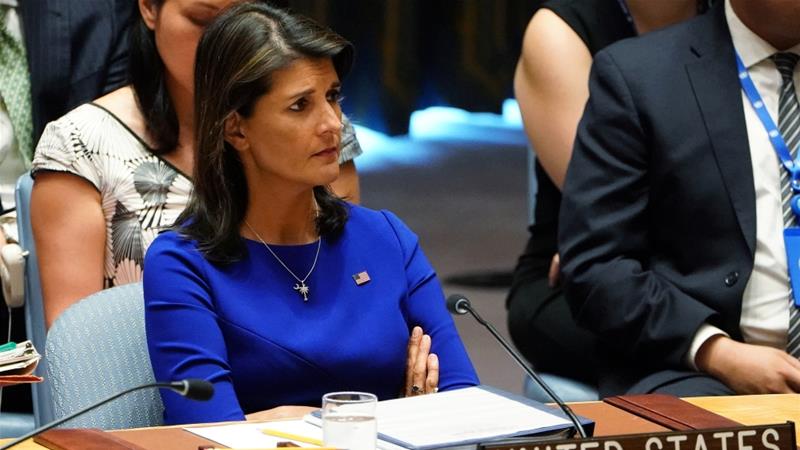US Ambassador to the United Nations Nikki Haley has suggested the right of return for Palestinian refugees could be removed from any eventual peace settlement with Israel.
Speaking at an event on Tuesday with the Foundation for Defense of Democracies, a Washington DC-based neoconservative think-tank with pro-Israeli sympathies, Haley was asked whether she agreed with taking the right of return off the table.
“I think we have to look at this in terms of what’s happening [with refugees] in Syria, what’s happening in Venezuela,” she said.
“So I absolutely think we have to look at the right of return.”
Palestinians view the right of return, along with the end of the Israeli occupation, as one of the basic tenants in achieving a peace deal with Israel.
Haley also accused the United Nations Relief and Work Agency (UNRWA) of exaggerating the number of Palestinian refugees it currently provides aid to and services for.
“We will be a donor if it [UNRWA] reforms what it does … if they actually change the number of refugees to an accurate account, we will look back at partnering them,” Haley said.
‘Starvation and distress’
There are more than five million Palestinian refugees in the occupied territories and surrounding countries of Jordan, Syria and Lebanon.
The majority are descendants of the 700,000 Palestinians ethnically cleansed from their villages, towns and cities by Zionist paramilitaries in 1947-1948.
In response to the refugee crisis, UNRWA was created the following year under UN Resolution 302, which stated its mandate to “prevent conditions of starvation and distress … and to further conditions of peace and stability”.
Since its inception, UNRWA has worked with governments on interim measures in anticipation of a “just resolution” to the Palestinian refugee question.
Adnan Abu Hasna, spokesman for UNRWA in Gaza, said the issue of refugees is political by nature.
“Because of this, it falls upon the international community to come up with a political solution,” he told Al Jazeera, adding this has nothing to do with a particular vision.
“We serve the Palestinian refugees until the Palestinian issue is resolved,” he said. “We execute what the resolution mandates. Once resolved, there is no need for UNRWA to exist.”
In January, the United States cut $300m out of $350m in funding for UNRWA, which forced the UN body to slash jobs and scale back its operations, much to the consternation of Palestinian employees and those who rely on its services.
Half a million Palestinian students in the occupied West Bank and Gaza Strip went back to the 692 schools operated by the UNRWA on Wednesday, but the agency said it only has enough money keep the them open until September.
Al Jazeera’s Harry Fawcett said Israeli media has reported the US is intending to go further by restricting the definition of Palestine refugees to only those who were forcibly displaced in 1948.
“They’re restricting the number from more than five million to 500,000, and indeed permanently cutting off all US funding to the UN agency,” Fawcett said, reporting from occupied West Jerusalem.
“It is something that Israeli Prime Minister Benjamin Netanyahu has long argued for, both the restriction of the definition of Palestine refugees and also the disbandment of UNRWA entirely,” he said, noting the agency provides food aid to more than one million Palestinians in the Gaza Strip.
Security implications
The Donald Trump administration has made no secret of its hostile view of UNRWA. In emails leaked to Foreign Policy magazine earlier this month, Jared Kushner, Trump’s son-in-law and senior adviser, described the agency in January as “corrupt, inefficient, and doesn’t help peace”.
During his visit to Jordan last June, Kushner reportedly pushed for the refugee status of the two million Palestinians registered in the country to be dissolved.
According to Fawcett, some Israeli military and security officials are worried about the repercussions of the moves.
“They have been telling the Israeli media that they are concerned about preventing UNRWA from operating because of the security implications that could have,” he said.
“So there is by no means a total acceptance of this plan in the Israeli establishment.”
[Source: Reuters]





 WhatsApp us
WhatsApp us 

